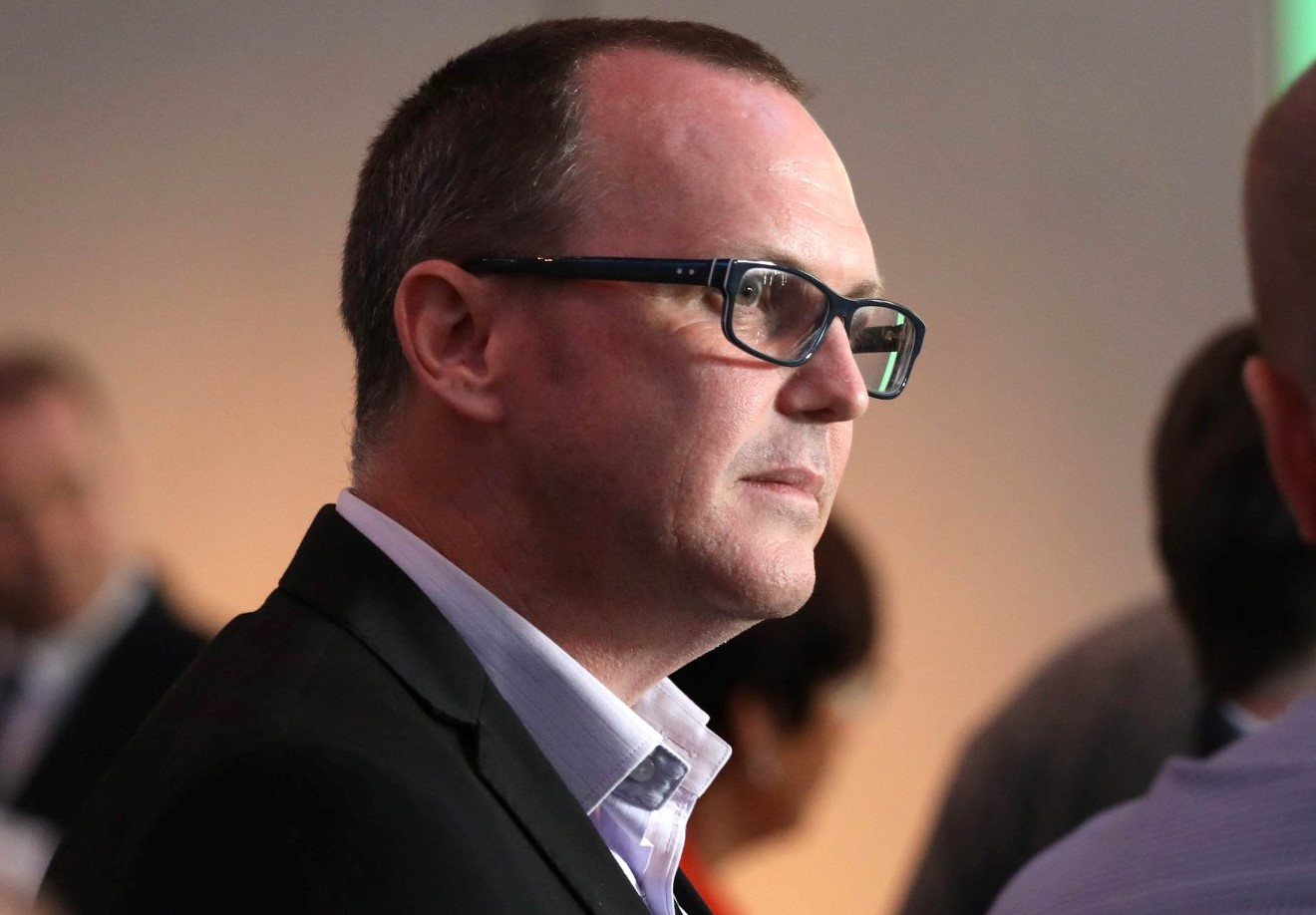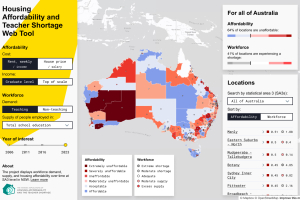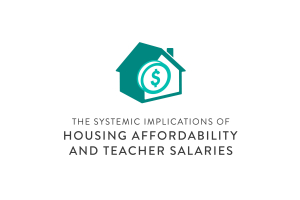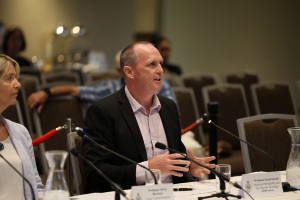
My Expertise
Professor Eacott leads an interdisciplinary research program concerned with the intersection of the teacher shortage, the housing crisis, and the organisation of education. The central question of this research program is How commutable are schools for their workforce? Professor Eacott and his team seek to develop tools for government, stakeholders, systems, and educators to better understand how best to meet legal, social, and cultural expectations in the provision of education.
Keywords
Fields of Research (FoR)
Specialist studies in education, Educational administration, management and leadership, Education systems, Housing markets, development and management, Housing policy, Urban analysis and development, Strategic, metropolitan and regional planningSEO tags
Biography
Scott Eacott, PhD is Professor of Education in the School of Education at UNSW Sydney and an Adjunct Professor in the Department of Educational Administration at the University of Saskatchewan. He has previously worked at the University of Newcastle and Australian Catholic University and prior to academia, the New South Wales Department of Education as a teacher and school leader in primary schools.
Building on his experience working in...view more
Scott Eacott, PhD is Professor of Education in the School of Education at UNSW Sydney and an Adjunct Professor in the Department of Educational Administration at the University of Saskatchewan. He has previously worked at the University of Newcastle and Australian Catholic University and prior to academia, the New South Wales Department of Education as a teacher and school leader in primary schools.
Building on his experience working in schools and studies across the social sciences, Professor Eacott's work is primarily concerned with the organisation of education. To this end, his research has been dedicated to developing the necessary explanatory tools and resources to respond effectively to the empirical question of how best to organise education. This work has led to advocacy for the pursuit of equitable excellence in school provision based on threshold questions (e.g., does this make us more equitable and excellent) with matching tests of legitimacy and strength, as the basis for systemic design which can be applied at the system, school or even team level.
More recently, in working with a consortium of education researchers, geospatial analysts, data visualisation experts, sociologists, economists, and data scientists, Professor Eacott has been conducting groundbreaking work on the impact of housing affordability on the teacher shortage. This work has demonstrated that many teaching positions are located in areas where it is unaffordable for the school education workforce (especially early career teachers) to live. Without large-scale inter-departmental co-operation, and multi-factor intervention, many schools will be unable to find staff as housing and transportation costs make cities unaffordable for the school education workforce.
Professor Eacott's distinctive approach has led to invitations to run workshops and give talks in Norway, Canada, the USA, Indonesia, South Africa, Mexico, Costa Rica, China, and throughout Australia. He has authored more than 100 publications, led major research projects and contributed to teams winning over $5.6M in external funding and successfully translated his research into policy and practice. Typical projects involve working collaboratively with governments, systems, and professional associations to co-design plans to best meet the needs of all involved.
My Grants
A representative sample of externally funded grants since 2020 includes:
- Eacott, S., Pettit, C.J., Han, H., Gilbert, C., & MacDonald, K.C., (2026-2028). Estimating the commutability of Australian schools for improved workforce planning. Australian Research Council.
- Dadvand, B., Eacott, S., Bourke, T., Mills, R., & Murphy, S. (2026-2028). Improving Teacher Retention in High-Turnover Areas: A Geo-Spatial Approach. Australian Research Council
- Eacott, S. (2025). What the profession needs now for the future research - Housing affordability project. Australian Education Union - Victoria Branch.
- Eacott, S., Pettit, C.J., Gilbert, C., & MacDonald, K.C. (2024-2025). The systemic implications of housing affordability and the teacher shortage. James Martin (now Australian) Institute for Public Policy.
- Eacott, S., Gilbert, C. & MacDonald, K.C. (2024). Building for the profession: Teacher housing in New South Wales. New South Wales Teachers Federation.
- Eacott, S. & Soundararaj, B. (2023-2024). Building a Unique Integrated Linked Dataset of Education and social Reporting [BUILDER]. Research Infrastructure Scheme.
- Eacott, S. & Baldry, E. (2022). Building education systems for equity, excellence, and inclusion. Academy of Social Sciences Australia Workshop Program.
My Qualifications
Doctor of Philosophy (Education). Supervisor: A/Prof James G. Ladwig
Master of Leadership and Management in Education
GradCert in the Practice of Tertiary Teaching
Bachelor of Teaching / Bachelor of Social Science
My Awards
- Team Leadership Award (Housing Affordability and the Teacher Shortage [HATS] Team), Australian Council for Educational Leaders (NSW), 2025
- Highly ranked scholar (#53 Leadership), lifetime, ScholarGPS, 2025
- Top Trailblazers in Education, The Educator's Room, 2025
- Emerald Literati Outstanding Paper of the Year (2023, International Journal of Educational Management), 2024
- Highly ranked scholar (#13 Educational Leadership) for the last five years, ScholarGPS, 2024
- Top 100 researchers (#20 Educational Administration, #29 Educational Management, #73 Educational Leadership), League of Scholars, 2023
- Neil Cranston Lecture, Australian Association for Education Research - Educational Leadership Special Interest Group, 2021
- Education Research Award, Australian Council for Educational Leaders (NSW), 2021
- Most outstanding reviewer, International Journal of Educational Management, 2020
- The Educator's Hotlist, 2019
- Australia's leading researcher in the field of Educational Administration (The Australian Research Magazine), 2018
- Visiting Scholar, University of Saskatchewan (Canada), 2018
- Visiting Scholar, Western University (Canada), 2018
- Hedley Beare Award - Most Outstanding Educational Leadership Writing (Australian Council for Educational Leaders), 2015
- Emerald Literati Outstanding Paper of the Year (2013, International Journal of Educational Management), 2014
- Book Editor of the Year, Untested Ideas Center (Niagara Falls, NY), 2013
- Fellow of the Australian Council for Educational Leaders (NSW), 2012
- Emerald / ALCS African Management Research Award, 2012
- Highly Commended, Emerald Literati Outstanding papers of the Year (2011, International Journal of Educational Management), 2012
- Emerging Research Leaders Program, 2011-2012
- Australian Leadership Award (AusAID), 2010
- Highly Commended, Emerald / EFMD Outstanding Doctoral Research Award, Educational Leadership and Strategy (Sponsor Journal of Educational Administration), 2009
- Runner-up, 7th Annual Emerging Scholar in Educational Leadership Award, 2009
- The University of Newcastle Teaching and Learning Fellowship, 2007-2008
My Research Activities
There is a global teacher shortage. UNESCO modelling estimates an additional 44M teachers are needed by 2030. Australian Government modelling indicates a >4,000 shortfall by 2025. 61% of Australian schools report daily activities being compromised by staffing issues, and 10,000 lessons go uncovered a day in New South Wales alone. $328M has been invested in a National Teacher Workforce Plan. However, initiatives to attract and retain teachers mean little if teachers cannot afford to live within commuting distance of their workplace. Professor Eacott's research program is dedicated to developing the necessary explanatory tools and resources to respond effectively to the systemic implications of housing affordability on the teacher shortage. This research program has the following aims:
- Establish novel estimates of the distribution of the school education workforce and the accessibility of schools.
Our researchers seek to develop tools for government, systems, schools, and educators to better understand the intersection of housing affordability, the teachers shortage, and the accessibility of schools.
- Develop state-of-the-art models of the accessibility of schools for their workforce to support the functionality and effectiveness of systems to deliver educational and social outcomes.
We bring broad interdisciplinary and methodological expertise to enrich the methodological toolkit for research and generate unparalleled data to enhance the validity of sensitive and controversial policy decisions regarding workforce distribution, housing affordability, and the accessibility of schools.
- Generate a body of robust empirical evidence to inform policy at a national and international level, locating the team as an international authority on housing the education workforce and its impact.
We aim to increase the quality of systemic decision-making through the provision of high-quality research accessible to multiple audiences. Through attention to fundamental concerns for policy makers at a national and international level our research will facilitate targeted and tailored intervention design.
Working at the intersection of education, geospatial analysis, economics of education, urban planning, sociology, demography, among others, and therefore leveraging cutting-edge analytical methods from multiple disciplines, Professor Eacott's ambitious research program aims to move beyond individual disciplinary based ways of understanding educational issues and its impact to not just inform policy decisions but explicitly contribute to re-designing the provision of education to deliver equitable and inclusive education at scale.
FACILITIES, EQUIPMENT, AND RESOURCES
In addition to standard office facilities and computing equipment, Professor Eacott has a Mobile Interactive Touchscreen Workstation (65" Commbox Pulse touch display and Motorised tilt stand / trolley) and in 2024 will be adding a 75" wall mounted Commbox display screen. This equipment enables interactive team meetings working with data and showcasing research data and evidence to visiting collaborators, partners, and university guests.
Existing resources include the Housing Affordability and Teacher Shortage Dashboard, a time series interactive map of housing and rental costs against teacher salaries in Australia. Plans are underway for further data infrastructure resources linking education, housing and social data.
GET INVOLVED
Doctoral, masters by research, and honours candidates
Please see the 'My Research Supervision' section below.
Visiting scholars, post-doctoral fellows, research interns, and collaborators
Professor Eacott welcomes proposals from highly motivated and talented researchers who believe they have the potential to contribute and make a significant contribution to advancing his research through post-docs, research internships, visiting scholars, and collaborations. If you are interested in working as part of the program, please send an email to discuss possibilities to Professor Eacott.
Government and key stakeholders
If you work in government or an organization and wish to partner with the team to undertake research, please contact Professor Eacott to discuss options. These can range from a specific case study within a larger project through to a targeted and tailored project.
Systems or group of schools
If you work in an education system and want to undertake a sub-set of the projects in your schools or across a group of schools, please contact Professor Eacott to discuss options. These can range from including your school(s) as site within the larger project or a targeted and tailored project.
My Research Supervision
Supervision keywords
Areas of supervision
Professor Eacott is constantly seeking outstanding researchers to undertake post-doctoral, doctoral (PhD, EdD), research masters and/or honours projects that advance his research program on the provision of education through rigorous and robust social science. Prospective students are encouraged to apply for fellowships / scholarships in their country of origin, or from Australia, that would allow them to travel to Sydney. UNSW offers several highly competitive scholarships for researchers. These range from annual stipends, living allowances, and coverage of tuition fee costs, as well as funding for travel. Further details can be found at the UNSW Graduate Research Scholarship Page.
In addition, Professor Eacott welcomes unfunded applicants wanting to work in the research program. Most importantly, we are looking for highly motivated and talented researchers who believe they have the potential to make a significant contribution to the team.
Professor Eacott's research program is concerned with the deceptively simple question of How commutable are schools for their workforce? Within this agenda, he is currently looking for higher degree researchers (PhD, Honours) to work on multiple projects:
Project 1: School education workforce distribution and H+T costs
Two fatal vulnerabilities in existing teacher shortage discussions are not knowing the current distribution of the workforce and limitations in ratio-based analysis of salaries to costs. As a result, it has proven difficult to develop, implement, and evaluate processes and incentives to match the workforce to schools. This project will deliver, at sale, and overtime, the geospatial profile of the school education workforce and link that to context specific housing and transportation costs.
Project 2: Teacher housing policy and reforms
The complexity of housing and education policy responsibility has made it difficult to assess the impact of initiatives on groups within the workforce. As a result, it is unclear what policies and initiatives have and have not delivered measurable changes overtime. This project will audit and synthesize existing evidence on policies and initiatives aimed at increasing accessibility of workplaces for teachers (and other essential workers) and curate evidence to inform targeted and tailored interventions.
Project 3: Data visualization and infrastructure
Traditional two-dimensional and print presentations often fail to capture the complexity, disparities, and burdens experienced by teachers and other essential workers in accessing their workplaces. We are developing expertise in building integrated data infrastructure and intuitive visualizations to enable policymakers and other stakeholders to identify patterns, make informed decisions, and advocate for targeted interventions. This project will build data infrastructure capable of visualizing hidden trends, highlighting spatial variations, and depicting the interconnections between H+T costs for educators, ultimately leading to more equitable policies, improved supports, and enhanced quality of life.
If interested in any of the above projects, and eligible, consider applying for a Scholarship. The next round closes on 13 March 2026 (Faculty deadline) for a T1 2027 start (School of Education EOI process close 4-6 weeks prior to the closing date). Details for scholarships can be found: Key Dates | UNSW Research. The ideal candidate will have: i) A 1st class Honours degree, or equivalent, in education, urban science, data science, social econometrics, public administration, public policy, or related fields; ii) Previous experience with either empirical research (e.g., GIS analysis, data mining of ABS and/or education statistics, qualitative skills in interviews or focus groups) and/or the application of social science frameworks to social problems; iii) Excellent time, data management, and interpersonal skills; and iv) Evidence of well-developed verbal and written communication skills. If you have any queries about the positions, please contact Professor Scott Eacott.
Currently supervising
Current supervised topics include:
- Housing affordability and the teaching workforce in Victoria, Australia
- Housing access, affordability, and commuting in a regional school district
- Housing, commuting and early career teachers
My Engagement
Based on his research expertise, Professor Eacott has been engaged by a number of government and industry organizations including:
- UNESCO 2024/25 GEM Report
- Commonwealth Department of Education
- Department of Foreign Affairs and Trade
- Australian Academy of Social Sciences
- National School Resourcing Board
- Data Insights Across Departments (DESE)
- Australian Education Union
- New South Wales Department of Education
- Homes NSW
- NSW Legislative Committee on Essential Worker Housing
- NSW Teachers Federation
- Steiner Education Australia
- Montessori Australia
- Montessori Schools and Centres Australia
- Maitland-Newcastle Catholic Schools Office
- RMIT Fact Check
- Major print, radio, and online media (e.g., ABC, Fairfax, NewsCorp)
MEMBERSHIP OF EDITORIAL BOARDS
- Educational Management, Administration & Leadership (2017-)
- Educational Leadership Theory book series (Springer, Founding Co-Editor, 2017-)
- Relational Sociology book series (Palgrave, 2015-2025)
- Journal of Applied Social Theory (2015-2025)
- Research in Educational Administration and Leadership (Section, Australia/Pacific Editor, 2015-2025)
- International Journal of Educational Management (2013-2025)
- Leading & Managing (2013-2024)
- Journal of Educational Administration and History (2013-, including Book Review Editor 2013-2017)
- International Journal of Leadership in Education (2013-)
- Leadership and Policy Quarterly (2012-2024)
- Perspectives in Educational Leadership (2011-2014)
- Journal of Educational Administration and Policy Studies (2009-2015)
MEMBERSHIP
- American Educational Research Association 2010-2024
- British Educational Leadership, Management and Administration Society 2010-2015
- Commonwealth Council for Educational Administration and Management 2010-2015
- Australian Association for Educational Research 2008-
- Australian Council for Educational Leaders 2003-2016
My Teaching
Using a variety of approaches in his teaching, Professor Eacott's classes are distinctive for their privileging of rigorous and robust discussion and debate of key issues. Unlike traditional lecture or tutorial models, Professor Eacott explicitly engages with participants by challenging their ways of thinking and seeking to develop a commitment to public intellectualism. Current courses taught include:
EDST5155 BUILDING EDUCATION SYSTEMS [post-graduate, Term 1 2026]
This course enables you to describe fundamental concepts, principles, theories, and terminology used in the main branches of education systems research, policy and practice, and apply that knowledge to new and complex environments. This course explicitly brings international and national commitments, legislation, and policy pillars together to develop robust system design principles and to audit and prosecute reforms. The course is of value to current and aspiring systemic personnel and those wanting to better understand how systems work at scale.
It is a core course (along with EDST5142 Education and Context) in the new specialisation of 'Education Systems' within the Master of Education and Graduate Certificate in Education.
EDST5142 EDUCATION IN CONTEXT [post-graduate, Term 3 2026]
The claim that context matters is ubiquitous in education. What that means and how it plays out in the provision of education across the lifespan and within and beyond traditional education sites is far less known. This course is designed to deepen your understanding of the intimate relations between education and context. Whether you work in early childhood, schools, tertiary environments or non-traditional spaces (e.g., health, military, non-for-profit, corporates), understanding contexts is imperative to achieving the best possible outcomes. This requires you to think beyond the boundaries of any individual educational site and consider the interplay of demography, geolocation, socio-economic status, access to services, among others, and the provision of education. To do this, you will systematically engage with large-scale education and social data to bring to life the theoretical and conceptual tools necessary to analyse, evaluate, problematise and reconstruct the provision of education.
EDST5433 Organizational Theory in Education [post-graduate, Term 3 2026]
In this course, you will engage in the application of organisation theory to education, and consider scientific management theory, bureaucracy and professional educators, human relations, open systems theory and contemporary critiques of conventional theories of educational organisations. In addition, you will consider important aspects of organisation, including educational goals, organisational culture, educational technology, the educational environment, inter-organisational linkages, organisational effectiveness, and alternative theories of educational organisation.
EDST5608 Instructional Leadership [post-graduate, Term 2 2026]
Judgements regarding effective schools, leaders and teachers have long been grounded in ideas of instructional leadership. In this course, you will examine the research literature relevant to instructional leadership as well as providing practical strategies for building school capacity. Criteria used to evaluate instruction will be considered as well as the relationship between leadership, culture and student outcomes. Contributions made by the principal, team leaders, teachers, community, systems, peers and individual students will be examined. Leadership processes which contribute to improved student outcomes will be analysed. Case studies, both nationally and internationally, of effective and ineffective schools and systems will provide the basis of a strategic framework for future planning. You should be able to relate the knowledge you gain from this course to your own personal and professional contexts.









